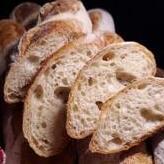-
Welcome to the eG Forums, a service of the eGullet Society for Culinary Arts & Letters. The Society is a 501(c)3 not-for-profit organization dedicated to the advancement of the culinary arts. These advertising-free forums are provided free of charge through donations from Society members. Anyone may read the forums, but to post you must create a free account.
What would vinegar add to bread dough?
-
Similar Content
-
- 7 replies
- 2,157 views
-
- 3,877 replies
- 651,444 views
-
- 24 replies
- 4,136 views
-
What a mug! 1 2
By Alex,
- 27 replies
- 2,060 views
-
- 5 replies
- 3,659 views
-
-
Recently Browsing 0 members
- No registered users viewing this page.







Recommended Posts